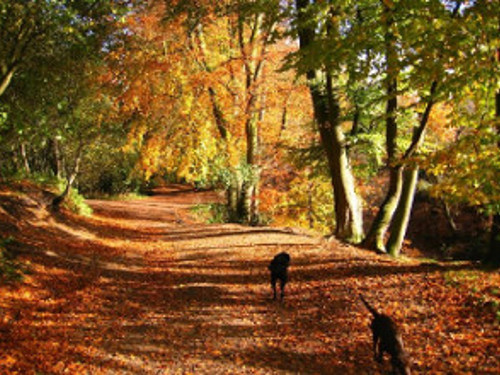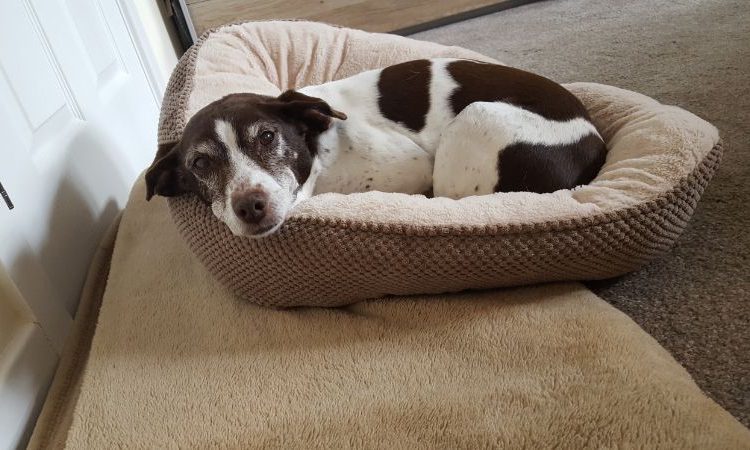It’s getting darker.
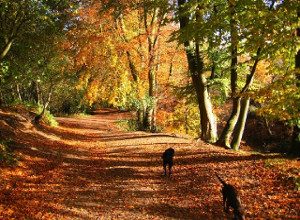 The nights are drawing in and you might just want to hibernate until the spring. I know I do.
The nights are drawing in and you might just want to hibernate until the spring. I know I do.
Unfortunately, we don’t have that luxury, and we just need to get on with it, but have you thought about how the season might affect your pets?
For a start, the change in weather (and the central heating) can bring on aching joints, dry skin and breathing issues, as it can with humans. That little bit of stiffness can turn into a niggling pain as winter approaches.
For those pets that venture outdoors, there are all kinds of potential dangers, mainly in the form of poisons.
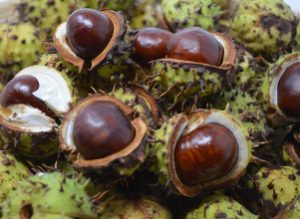
- Damp leaves, particularly when piled up, can be a breeding ground for bacteria and mould, which if ingested, could lead to digestive problems such as a loss of appetite or even vomiting and diarrhoea.
- A number of common plants and trees can be a problem at this time of year. Chrysanthemums, for example, can be toxic to both cats and dogs. Conkers and acorns can also be a problem. Although serious poisoning from conkers is rare, there is a risk of intestinal blockages when they are ingested. Acorns are a different matter – the toxic ingredient is thought to be tannic acid, which can cause damage to the liver and kidneys.
- Avoid using slug pellets. These are toxic to all animals, and can cause serious problems.
- At this time of year, rats and mice start to look for somewhere warm. It might be tempting to put poisons down to keep them under control, but apart from the risk of these affecting your pets, they will also work through the food chain, potentially killing owls and other natural predators.
- Try to keep screenwash and antifreeze in your car and off the floor. These both have a particularly sweet taste (or so I am led to believe) but are deadly when ingested.
Some dogs and cats don’t get as much exercise in the colder months.
For outdoor cats, who generally have the choice of if and when they go out, you might need to adjust their food intake to make sure they don’t start to gain weight. Having the heating on can also dry out the atmosphere, so make sure they always have a supply of clean water.
If your cat does continue to go outdoors during the colder months, make sure they don’t stay out for too long especially when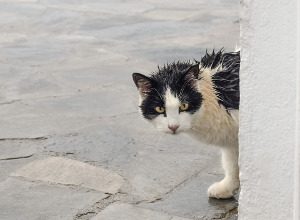 temperature is below freezing. If you don’t want to leave them out all day while you’re at work, let us know, and we can call round to let them in and check on them. Also look out for frostbite. It is most common on the ears, the tail and pads, and looks pale, glossy or white.
temperature is below freezing. If you don’t want to leave them out all day while you’re at work, let us know, and we can call round to let them in and check on them. Also look out for frostbite. It is most common on the ears, the tail and pads, and looks pale, glossy or white.
Make sure you sound your horn or bang the bonnet before starting your car as cats do have a tendency to curl up on the tyres or near the engine.
Dogs don’t generally get much of a choice. They go out when they need to and get walked when we take them. As with cats, if they are not getting as much exercise, you might need to adjust their diet. However, the simplest way to remedy this is to get in touch with us, and we can exercise them for you, even when you’re at work and it isn’t quite as cold.
If your dog is prone to feeling the cold (you should have an idea of this) then a coat could be a good idea. I’m sure they will appreciate you keeping the rain/sleet/snow of their back. If you dog goes off the lead, invest in a collar that lights up – as well as being useful when finding your dog, darkness won’t be a defense when it comes to fouling, so it’s good to know when they are standing (or squatting) still. A torch is also handy for this reason.
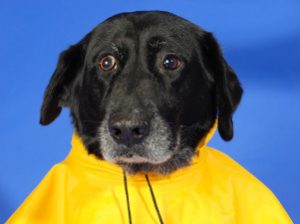 Your own personal safety is also something you need to keep in mind. A high visibility vest or some reflectors are invaluable when walking along dark roads. However, it might best to stay in areas with lighting and other people about. Try to avoid distractions such as phone calls or listening to music, both for your own safety and for that of your dog – it’s much easier to lose them in the dark.
Your own personal safety is also something you need to keep in mind. A high visibility vest or some reflectors are invaluable when walking along dark roads. However, it might best to stay in areas with lighting and other people about. Try to avoid distractions such as phone calls or listening to music, both for your own safety and for that of your dog – it’s much easier to lose them in the dark.
Chocolate sales rise around Halloween, and again when Christmas approaches. Remember that chocolate is highly toxic to dogs due to a stimulant called theobromine. The amount varies depending on the type of chocolate (dark chocolate contains the most), but it can cause damage to the heart, central nervous system and kidneys. Always keep it out of reach.
Flea and tick problems also increase over the autumn period, with a peak when people start turning on their central heating. Make sure you keep treatments up to date, and check your pets regularly.
Outdoor caged animals are another consideration.
If you keep rabbits or guinea pigs outside, then now is the time to start planning their location for the colder months ahead. Let 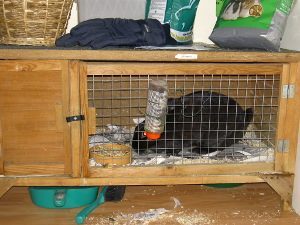 them have a little extra hay in addition to their usual feed to increase their calorie intake, they don’t hibernate so they need the little extra.
them have a little extra hay in addition to their usual feed to increase their calorie intake, they don’t hibernate so they need the little extra.
Under no circumstances should you use hot water bottles or electric blankets as they can cause burns and are a fire risk. Adding some extra bedding should be sufficient.
The firework season seems to be starting earlier each year and can be a stressful time for all pets. Try to keep your pets inside around this time, and if there are known problems, visit your vet for advice – a mild sedative can be a great help.
There’s no reason why the change in season should be a problem.
Just be aware of the risks, and be prepared.

